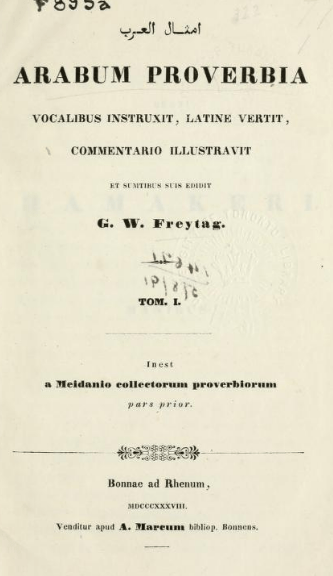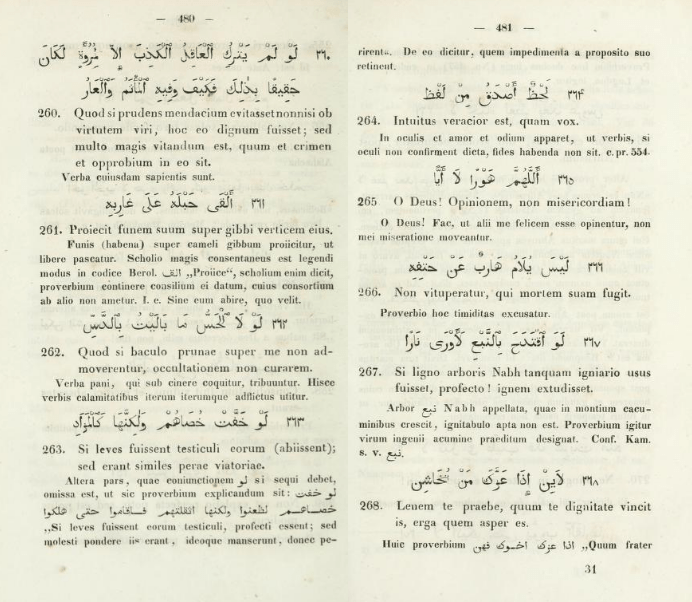
About a year ago one of the readers here at Fortress of the Mind informed me of a work of scholarship that he thought might be of interest. The work was Georg Wilhelm Freytag’s monumental Latin treatise Arabum Proverbia (literally Proverbs of the Arabs, but better rendered as Arabic Proverbs), a three-volume collection of classical Arabic proverbs drawn from the Compendium of Proverbs (مجمع الامثال) of the medieval philologist Ahmad Ibn Muhammad Al-Maydani (احمد ابن محمد الميداني). I was able to locate this impressive yet forgotten work, and have found much pleasure in poring over its pages.
Georg Wilhelm Freytag (1788-1861) was a German orientalist and philologist. Born in Lüneburg, he attended the University of Göttingen, trained in theology, and apparently intended to enter the ministry. After a brief stint as a chaplain in the Prussian army, he undertook the serious study of near Eastern languages (Arabic, Hebrew, Turkish, and Persian) in Paris. He was eventually appointed a full professor at the University of Bonn, remaining in that position until his death in 1861. He was a serious and dedicated scholar; among other works, he produced a two-volume work in Latin on Arabic songs, a reference work on Hebrew grammar, and a massive Arabic-Latin dictionary.
Let us say a bit more about the Arabum Proverbia. Published in 1838, it is written entirely in Latin and Arabic. It contains thousands of proverbs covering a wide variety of subjects; the proverbs are printed in Arabic, followed by Latin translations and explanations. The three-volume set seems never to have been printed in a second edition after 1838. Freytag imports his proverbs wholesale from his source, the medieval compendium of Al-Maydani, but it is not a direct translation of that older work. He culled out the proverbs, but added his own translation and commentary for each proverb. The proverbs are arranged alphabetically (according to the Arabic alphabet) with the first letter of the first word in the proverb used as the marker. Al-Maydani was born in Nishapur and died there in 1124; and his Compendium of Proverbs is itself an impressive achievement for one mind. His name in Latin is Meidanius. I have not examined Al-Maydani’s work, but it fills four large volumes in its modern published form. It does not appear that either Al-Maydani’s Arabic work or Freytag’s Latin work have ever been translated into English.

As stated earlier, the Arabum Proverbia fills three substantial volumes. It is available in digital form, and what purports to be a reprint is available for sale at Amazon.com. However, the digitized version of the work contains scanning errors that make some pages illegible. The reprinted version simply reproduces these errors. It is entirely inadequate in that it omits the second volume of the set, and carelessly deletes the first twenty pages of the third volume. To obtain my own physical copy, I bought the reprints of the first and third volumes on Amazon (inadequate as they are), and brought a digital copy of the second volume to Kinko’s to have it printed and bound in six thick spiral binders. It was expensive, but to me worth the price; painstaking scholarship is nothing less than a treasure.
Here are images of the partial work as it can be purchased on Amazon:

The photo above shows the work as it is available in reprints on Amazon. But the problem is that it is not the complete work. The volume on the left is volume 1, and the two books on the right are Freytag’s volume 3, broken into two parts. The first 20 pages or so of volume 3 are also missing, the result of careless preparation. All of Freytag’s volume 2 is missing. I had to download it on flash drive and then print it out at my own expense:

In fact, the entire work needs a thorough going-over; it should be typeset in modern font, properly indexed, and outfitted with new Arabic quotations that can be easily read. The digitized version available online and the truncated “reprint” published by the University of Michigan are inadequate. The proper solution is for someone to locate an original copy of the 1838 edition, and work directly from this archetype.
Here are the contents of each volume (tomus):
Volume I: Introduction to the work, description of sources, and proverbs from the letters hamza (ء) to zad (ص). Freytag provides the original Arabic proverb, followed by a Latin translation and brief commentary to explain its origin or meaning.
Volume II: Proverbs from the letters dhad (ض) to ya (ي)
Volume III: Assorted proverbial sentiments (sententiae proverbiales), days noted among the Arabs for conflicts (dies inter Arabes pugnis celebres), assorted humorous sayings (facete ingenioseque dicta), and indices. Freytag makes an effort to organize his mass of proverbs by subject matter.

Freytag shows great sensitivity to the importance of his subject matter. For him, proverbs are not just noteworthy sayings; they are repositories of a people’s cultural wisdom, and ought to be studied with assiduous diligence. In the introduction, he explains:
Among all things produced from the human mind, none are found so worthy of our attention so much as the proverbs of nations; for just as a tree may be understood from its fruit, so may the natural condition of a people’s mind be known from its proverbs. Proverbs acquaint us with the thinking, feeling, and habits intimately coherent in a people’s regular life. History teaches the external history of a people; proverbs display what the nature of their souls may be. History describes the reasons for the thinking and actions of individual men and the power that a people might possess; proverbs paint the rationale for the thought and action of the entire nation. Although proverbs are spoken by individual persons, nevertheless, because customs come to be enshrined in proverbs, an entire people has asserted itself, such that the thoughts and feelings of an entire people must be deemed to be in rational harmony. And since the footprints of each specific nation’s thoughts and feelings are impressed with proverbs, they are for this reason more worthy of our attention. In this respect it must be seen why Arabic proverbs, for which we here devote our energetic attention, are more deserving than others.
Freytag was not the first scholar to undertake a collection of proverbs drawn from Al-Maydani. Henricus Albertus Schultens published his own edition in 1795, but his work is not as extensive or as complete as Freytag’s. In its scope, attention to detail, and execution, Freytag’s Arabum Proverbia is a masterpiece of laborious scholarship. This long-neglected work deserves the services of a proper editor and translator. Even for those comfortable with Latin, the text in its present form is in need of a thorough overhaul. The Arabic text needs to be set in modern font (preferably without voweling), and the indices need to be updated with modern conventions. An English edition would help ensure that this classic reaches the audience that it deserves.
Read more in Sallust:


You must be logged in to post a comment.